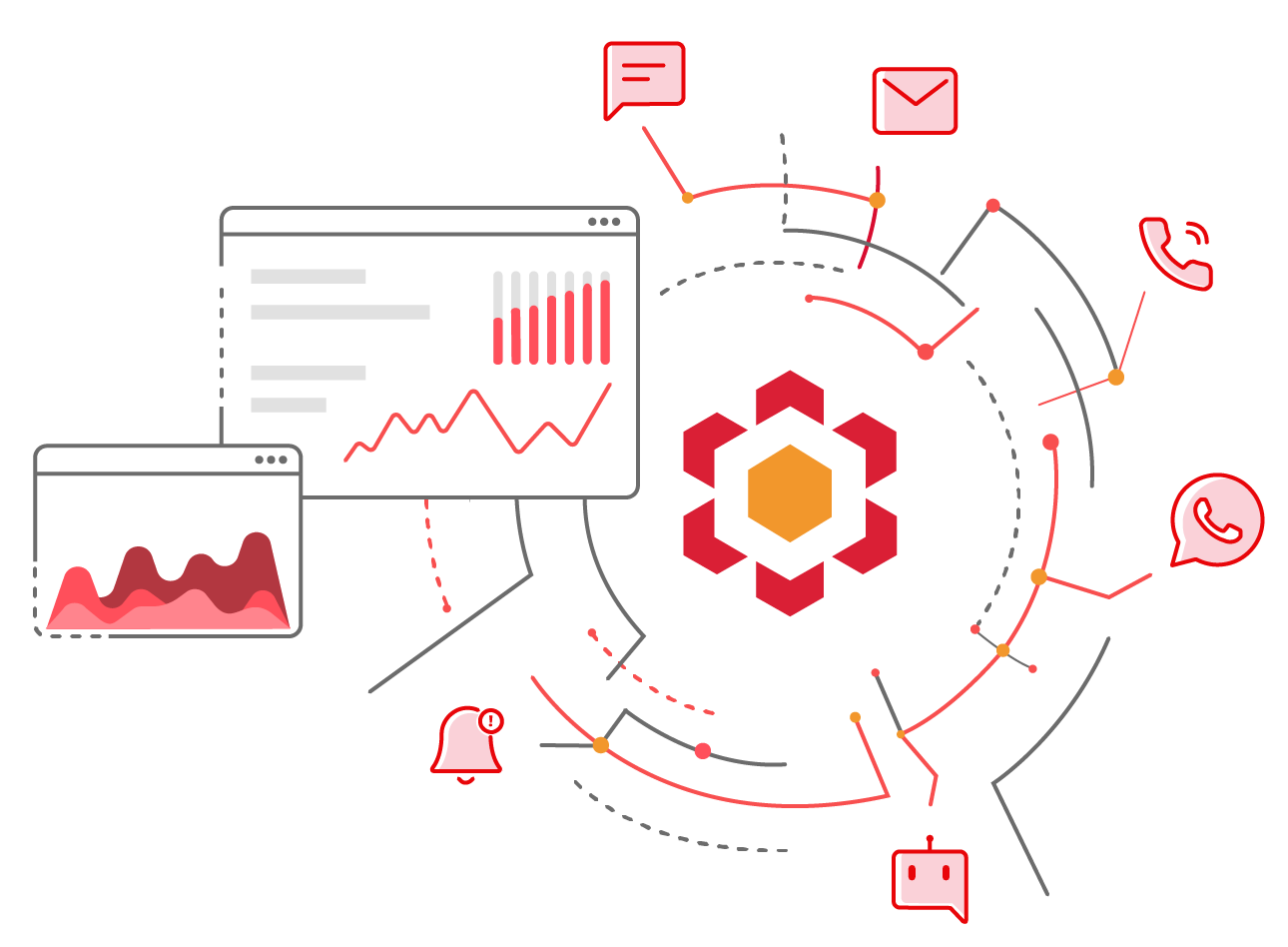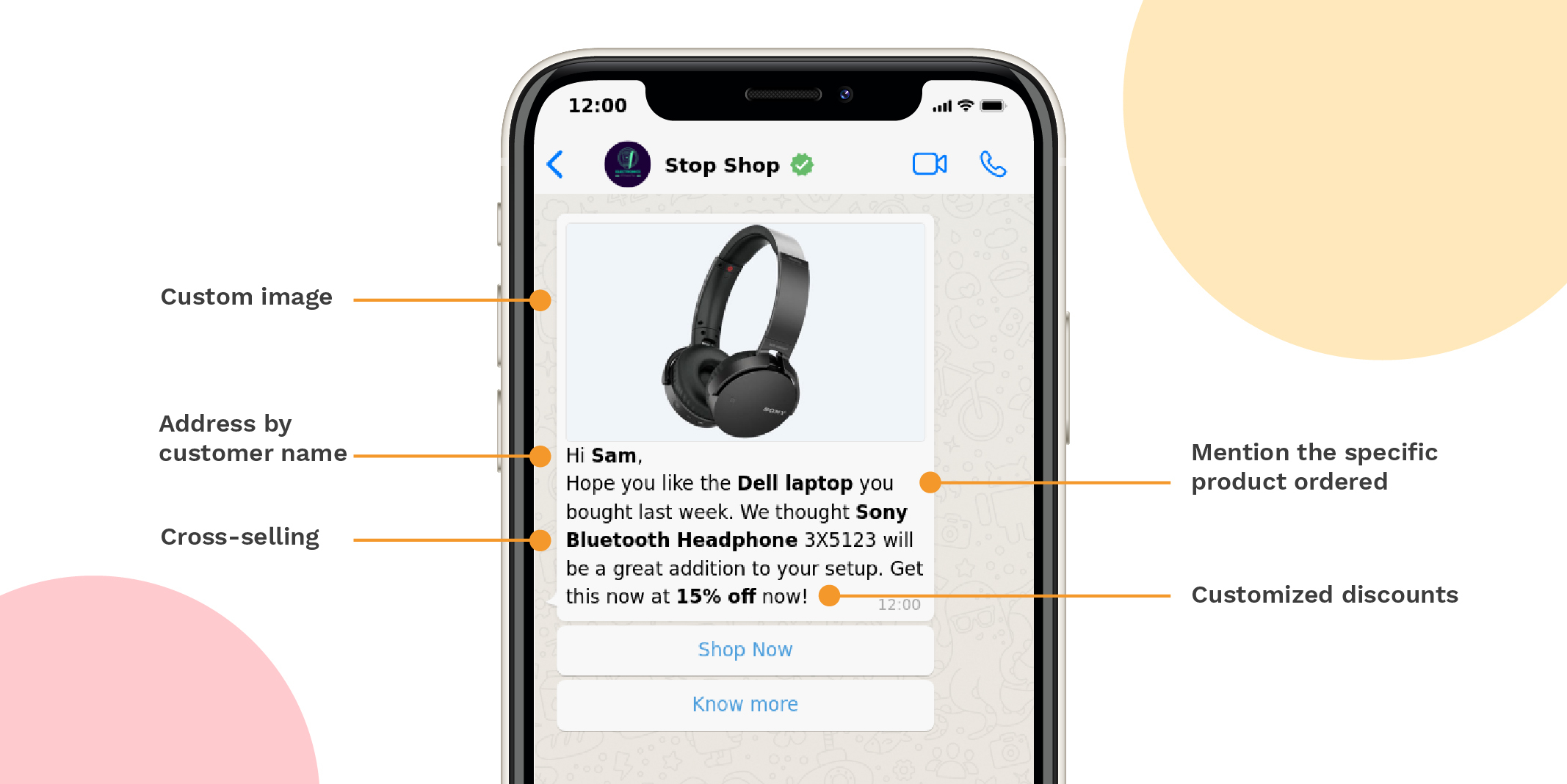WhatsApp is used in more than 180 countries worldwide, making it one of the most popular instant messaging apps. While the platform’s user-friendly interface is excellent for seamless customer interactions, its advanced features make it a powerful tool to sell your products effectively. By leveraging WhatsApp for sales, businesses can increase their ROI significantly, as the platform offers a familiar channel for real-time interactions.
Why Choose WhatsApp Business Platform?
Many businesses struggle to engage customers as they discover, learn, purchase, and experience their products. The modern customer journey is complex and involves decision paths and brand interactions throughout the purchase process. With WhatsApp, you can design conversational experiences for customers by having personalized and relevant communication at every stage.
The WhatsApp messaging ecosystem consists of the Messenger app, WhatsApp Business app, and WhatsApp Business Platform. The Messenger app is for personal communication. The Business App is for small businesses, offering them a way to promote their products and connect with customers easily. However, it lacks features businesses need to scale their marketing and provide frictionless buying experiences.
The WhatsApp Business Platform is versatile and is ideal for medium and enterprise businesses looking to engage customers throughout the customer journey. It allows you to showcase your offerings and share them with customers who can browse and add items to their cart while staying in the conversation.
WhatsApp’s automation features make gathering data from leads easier. Moreover, a salesperson can effectively manage multiple sales conversations simultaneously, increasing the chances of conversions.
Benefits of WhatsApp Sales for Enterprise Businesses
Today’s customers are empowered with endless choices at their fingertips, and customer experience is a key differentiator when making purchase decisions. WhatsApp Business Platform makes it easy to build long-term customer relationships through two-way communication.
Here are the top benefits of using WhatsApp for Sales:
Real-time Updates and Notifications
Real-time updates and notifications ensure that customers stay informed throughout their buying journey. Post-purchase updates increase engagement and also provide cross-selling and upselling opportunities.
Enhanced Customer Support
With WhatsApp automation, customers can get instantaneous answers to their questions, eliminating the need for back-and-forth emails. Moreover, you can help customers evaluate products by sharing manuals, video testimonials, and product demos, quickening their decision-making process.
Global Reach
WhatsApp has an extensive user base of over 2 billion people worldwide, allowing you to expand your customer base and reach diverse audiences.
Direct Customer Communication
Customers want to easily find what they’re looking for with a quick search on their mobile phones. WhatsApp is a convenient channel where customers can directly communicate with businesses, explore products, and complete purchases.
Increased Engagement and Trust
WhatsApp sales encourages meaningful dialog, improving customer engagement. Moreover, its robust encryption, along with data compliance regulations, builds trust. Customers can feel secure while sharing sensitive data, especially with banks and healthcare providers.
EBOOK
Scaling Communications: CPaaS and Global Expansion
Learn how to unlock the potential of CPaaS for seamless global communication and unprecedented success.

Strategies for Using WhatsApp for Sales
1. Personalized Messaging
71 percent of people expect businesses to deliver personalized interactions, according to a Mckinsey report. WhatsApp allows you to design custom journeys based on key customer information. You can send tailored messages to customers based on data, including their conversation history and purchase patterns.
Address customers by name and send personalized discounts and offers. For example, if a customer has added an item to a cart, send a custom coupon code, encouraging them to complete the purchase. To increase sales, you can also give customers VIP treatment by sharing exclusive early access to a sale or product previews.
Personalized conversations boost loyalty and can result in repeat sales. For example, if a customer recently purchased a laptop, send personalized offers for headphones or other digital accessories. Similarly, you can notify customers of a price drop in the items customers have shown interest in.
2. Product Catalog
The product catalog allows you to exhibit your offerings to customers on WhatsApp. You can share high-quality product images, detailed descriptions, website links, and other valuable details, increasing the sales potential.
WhatsApp’s catalog feature acts as a digital storefront where customers can explore and compare your products. Moreover, it allows customers to shop with the help of the ‘Add to Cart’ option without leaving the WhatsApp messaging interface.
Businesses can share single and multi-product images to simplify the shopping process. For example, if a customer is checking the availability of carrot cake, the bakery can share a single product message, making it easy for the customer to view the product details. Similarly, if a customer wants to know which products are on sale that week, you can share a multi-product message that shows a selection of products.
3. Click-to-Chat
WhatsApp’s click-to-chat feature allows customers to initiate a conversation with your business without having to save your phone number. This feature works on phones and WhatsApp web, and is a convenient way for customers to begin a chat with you directly.
You can create a link simply by using https://wa.me/<number>, where the <number> is your full phone number in international format. Omit zeroes, brackets, or dashes when including the phone number. For example, use: https://wa.me/1XXXXXXXXXX
You can also add pre-filled messages with the link. For example, when a customer clicks the chat link, the conversation will begin with the pre-filled message, “Hi, I’m interested in your 21-day fitness program”.
You can integrate the link on a ‘Chat on WhatsApp button’ and use it on landing pages, contact pages, social media pages, and mobile apps. You can also embed the links in images or QR codes, which can be used on brochures and in-store flyers. The more convenient you make customers to reach you, the higher the chances of conversions.
4. Integrations
Integrating CRM, marketing automation tools, or a knowledge base system with WhatsApp Business API opens the doors for increased WhatsApp Sales. It helps you provide end-to-end journeys by streamlining processes and communication flows.
You can send pre-programmed responses triggered at specific points, enabling the automated delivery of personalized welcome messages, alerts, and updates. Access to customer insights helps salespeople respond quickly with accurate and personalized information, improving efficiency. Moreover, integrations with existing business systems increase productivity while saving time.
5. Rich media
WhatsApp’s rich media features, such as images, videos, and interactive elements, make conversations more engaging, capturing customers’ attention effectively. Images and videos convey information more vividly, making your offerings easy to understand. Moreover, you can personalize your brand’s messaging to make conversations more memorable. Here are some of the rich media available with WhatsApp
-
- Images
- Videos
- Documents
- Audio
- List messages
- Interactive buttons
- Single product message
- Multi-product message

6. Integrating Call to Action Button for WhatsApp Sales
WhatsApp button messages offer a simple way for customers to get the information they seek and take action. With WhatsApp call-to-action (CTA) buttons, you can easily direct customers to your website or encourage them to contact you.
CTA message templates can have a maximum of two buttons:
– A phone number customers can call with a click.
– A website address that takes customers to a specific section on your website.
You can use CTA buttons to encourage actions such as making a purchase, renewing a subscription, attending an event, redeeming rewards, etc.
By tracking responses to the interactive buttons, you can segment customers and send personalized messages. Button messages increase the chances of sales because they have higher response rates compared to text-based messages.
7. WhatsApp Messaging Templates
With WhatsApp templates, you can send pre-created structured messages to opted-in customers. Template messages help maintain consistency and clarity in communication. For example, you can use a template message with customized details to automatically send an abandoned cart recovery notification.
Meta requires approval of message templates in a business-initiated conversation to avoid spamming and ensure content quality. With messaging templates, you can craft compelling, error-free messages ahead of time with optimal personalization. You can use templates for announcing a sale, product launches, and event invitations.
8. WhatsApp Automation
WhatsApp business automation allows you to set up automated responses to different triggers, such as a welcome message to a new contact or quick replies for FAQs.
With WhatsApp chatbots, you can automate the process of collecting information from leads or getting feedback. For example, you can program the chatbot to request the user’s name and company email address. Furthermore, chatbots can collect data such as company size or family income for lead qualification.
WhatsApp chatbots take pre-defined actions based on triggers such as a phrase or a keyword. The chatbot’s decision-making logic ensures that responses are accurate and relevant.
For example, if a customer enquires about a product, the chatbot responds with corresponding details. Instead, if the customer wants to contact support, the bot helps the customer request a callback or email an agent.
9. Analyze Performance and Optimize Campaigns
WhatsApp Business Platform offers numerous features for measuring the performance of your efforts. This helps assess the effectiveness of your WhatsApp marketing campaign strategies. For example, you can optimize your message copy and improve the quality of your FAQ resources to improve engagement.
How to Get WhatsApp Business API?
Kaleyra, a global leader in cloud communications, can help your business make the most out of the WhatsApp Business Platform. Here are a few simple steps to get started.
1. Verify your Business – Complete the business verification process by verifying your identity, matching your business name and details to your Facebook business page, and confirming your verification code.
2. Onboard with Kaleyra – Register for an account with Kaleyra and connect your Facebook business page details to your Kaleyra account.
3. Provide memorable conversational experiences – Send dynamic messages to customers using templates after approval and unlock a rich communication channel for customer engagement.
Want to know more about using WhatsApp for Sales? Contact our conversational messaging experts today!

Kalaivani Narayanan
Content Specialist
Supercharge Your Communication!
Get in touch with our experts who strive hard to bring the very best in cloud communications technology to you.


